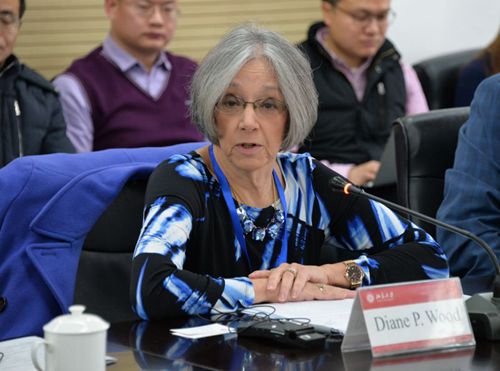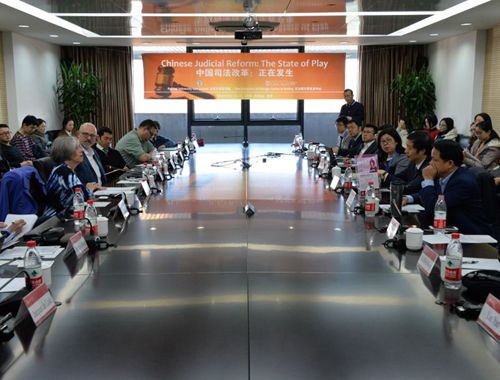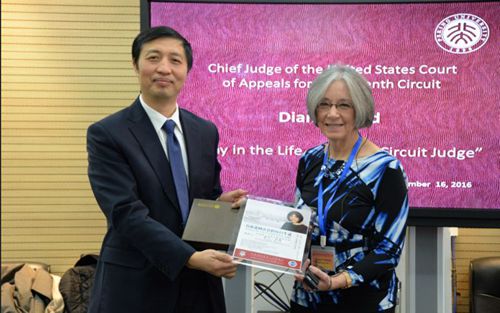Diane Wood :Self-Management is a Compulsory Course for Judges
Date:2016-12-23
On December 16, 2016, Diane Wood, Chief Judge of the US Court of Appeals for the Seventh Circuit, visited Peking University Law School and gave a lecture on "The Daily Life of the Chief Circuit Judge". Judge Diane Wood gave a detailed and comprehensive picture of the circuit court system and the system of judge supervision in the United States, shared the working status as a judge and emphasized the importance of the judge's self-management.

94 federal courts across the United States are divided into 12 roving zones, each with a federal appeals court. The Federal Court of Appeal has ruled primarily on appeals from District Court judgments in its federal jurisdiction. In addition, the Federal Court of Appeal has national jurisdiction over specific cases, such as those relating to patent law and cases adjudicated by the Court of International Trade and the Federal Compensation Court.


In the United States, the professional ethics of judges is expressly regulated and supervised. Any citizen may lodge a complaint to a review board or panel of experts on a judge's violation of ethics. These committees and panels are composed of judges and the general public. In addition, the most important means of supervision for judges in the United States is the self-discipline of judges. This self-discipline is closely related to the legal education system and legal tradition in the United States. Self-management is a compulsory course for judges. The judge is not only the interpreter of the law, but also the judge of social justice and bear the responsibility of the law and social managers. Therefore, each judge must be strictly managed by oneself and take each case seriously, and strive to be legitimate, reasonable, fair and equitable.
As the Chief Justice, Diane Wood's day was busy and fulfilling. She not only hears the case personally, but also has to deal with personnel, financial and other administrative matters of the Court. During the trial, she frequently discussed the case with other judges to ensure that the case was handled with the utmost care. Many cases are so complex that the judges have to give up their leisure time and work at home.
President Zhang Shouwen expressed his heartfelt thanks to Judge Diane Wood for her visit and speech on behalf of PKU Law School. He said that China's judicial reform is underway, which both needbe based on China's national conditions, and also need actively learn from the excellent experience of foreign countries. He hoped the two sides can actively carry out exchanges and cooperation, mutual exchange in learning. Judge Diane Wood expressed her gratitude to President Zhang Shouwen and said she was honored to give a lecture at Peking University Law School. She hoped that her sharing would benefit Peking University teachers and students.
In addition, Professor Jeffrey Lubbers of Washington University School of Law, researcher Neysun Mahboubi of University of Pennsylvania, Juris Professor Nuno Garoupa of Texas A & M University, Juris Professor Paul Craig of Oxford University, International LawProfessor Tom Ginsburgof University of Chicago, Judge Tino Cuellar of California Supreme Court, Assistant Professor William Hurst of Northwestern University, Associate DeanLin Yan of Shanghai Jiaotong University Koguan Law School, Associate Professor He Xin of City University of Hong Kong, Wang Xixin,Vice President of Peking University Law School, Professor Zhang Qi,Prof. He Weifang, Prof. Fu Yulin, Associate Professor Hou Meng, teacher Cao Zhixun and Assistant to the President, and Li Yuanyuan, Director of the Foreign Affairs Office of Law School, attended the lecture.
Translated by: Yang Wanyi
Edited by: Zhou Wenhao



